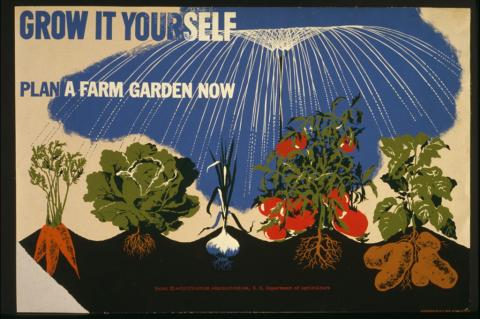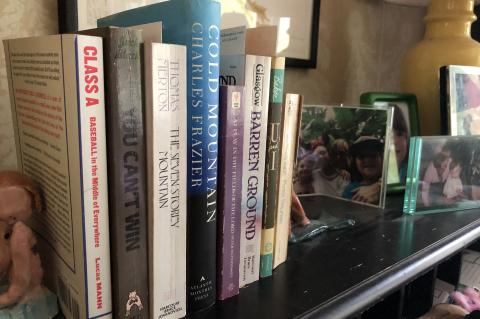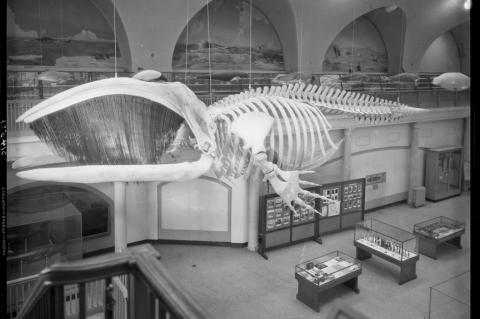I am only too happy to revisit Midtown. I will never see another youthful dawn in Alphabet City, but there will always be Macy’s.
Opinion
Streaming television is supposed to be sleek and high-tech, but its nether reaches remind me of the old UHF channels.
 Guestwords: The Home Farm Project
Guestwords: The Home Farm ProjectThis year I finally planted my victory garden. My coronavirus home farm, inspired by the victory gardens of World War II.
I know my social media apps and Google search history are tracked, but now I am starting to think that Duolingo is spying on me, too.
When white Americans talk about a “second civil war” there can be no mistaking their meaning — a return to a divided society with men at the top and Black Americans and other segments of the population at the bottom.
One of the many things that struck me on my recent and ongoing sail from Marblehead, Mass., to East Hampton is how accommodating the communities on the other side of the water are to passing boaters, especially as compared to Long Island.
Last week, a production crew from a PBS show called “Legacy List” landed on Edwards Lane to film an episode — starring my house, my family, and the contents of my attic, basement, and barn.
Suffolk County provides health clinics and low-cost buses for East Enders, but the paradox of a cash crisis UpIsland that will largely be escaped here does point to an unresolved question, whether the five East End towns are so different that their needs would be better served by breaking away and trying something new.
By the numbers, Donald Trump had a better chance of recovery than many Americans. Statistics from across the country show that Black and Latino patients die from Covid-19 disproportionately more than other ethnic groups do.
 Gristmill: The Halfway Club
Gristmill: The Halfway ClubWhat exactly does it mean when you can’t finish a book — not once, but over and over again?
With my hat, sunglasses, and N95 mask, I’m even more invisible than a middle-aged, gray-haired woman usually is in America. Not that I mind all that much.
Local governments on the East End are losing hundreds of thousands of dollars in missed revenue by not charging for public parking in some areas.
This column is being written toward sunset from the harbor at Plymouth, Mass. Alone time, something so many of us say we want, is elusive, but I have had time to think this week.
“Cancel” is the word of the year, and not just in the social-shunning sense.
Among the most important races in the Nov. 3 election are those not making headlines, yet a functional American democracy depends on them — the contests for state-level positions.
If Long Island’s Car Free Day was good for anything at all, it was the irony of it coming on a day when Suffolk officials announced that the county’s low-cost bus service could be cut by nearly half.
 Gristmill: Fear of Flying
Gristmill: Fear of FlyingThe airline industry may be on the verge of collapse, but once upon a time pilots were celebrities, dating movie stars, driving fancy cars — hold the autopilot, thank you very much.
President Trump’s three main economic initiatives — tax cuts, tariffs, and deregulation — have turned Washington, D.C., and the country upside down. How has this worked out? Here are some outcomes.
In the economic wake of the novel coronavirus, few things have been more emotional — a roller coaster of concern, inspiration, and worry — than watching friends who own, manage, or work in restaurants struggle and pivot and improvise and roll with the punches in their fight to keep the kitchen fires burning.
It did not take long for the president to shift attention from new and stunning revelations about his tax-avoidance schemes and precarious financial position, as detailed this week in The New York Times.
Since we are all still feeling our way around remote work and online meetings, I thought that I would ask my high school junior for a few tips.
A creeping dread — of finding ourselves homebound again, wearing fuzzy slippers and harassed expressions around the kitchen table, bickering about who ate the last Klondike Bar — has driven me to wallow in as much outdoor time as I possibly can before the temperature falls.
Whether President Trump’s low favorables will hurt him in Suffolk County is a real question, one on which Lee Zeldin’s immediate political future depends.
In remarks last week, Gov. Andrew M. Cuomo talked about the difficult task of allowing businesses to operate during the Covid-19 pandemic.
 Gristmill: Tour No More
Gristmill: Tour No MoreI was limited to 20-minute segments of highlights over a small laptop screen, but even that couldn’t diminish the pleasures of the Tour de France.
A memorable excursion into independence at Loon Lake in the Adirondacks.
 The Shipwreck Rose: Love Thine Enemy
The Shipwreck Rose: Love Thine EnemyI am extremely bent out of shape about the apparent near-future extinction of the Atlantic right whale.
Water quality projects under consideration appear to be a positive step to protect groundwater and improve conditions in the town’s various waterways and ponds, but we remain concerned about the economic and environmental worth of the projects that the C.P.F. funds.
In an election that will have long-lasting repercussions, voters rejected three East Hampton Village incumbents on Tuesday, instead embracing a message of change.
